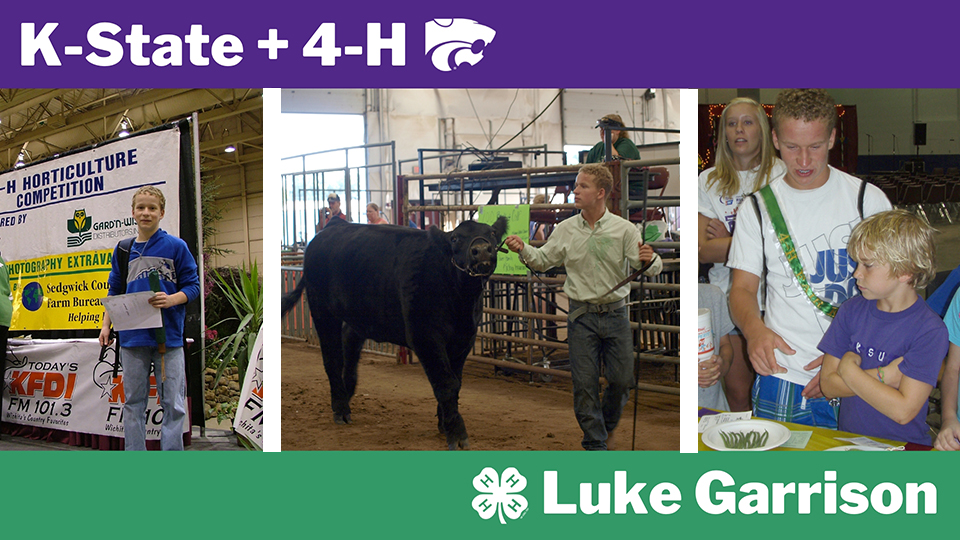How 4-H prepared young K-State alum for college and career
Although Luke Garrison ’17 might not be raising steers, preparing vegetables or taking
photos to show at the county fair anymore, he still carries with him the lessons he
learned during his time in 4-H.
Garrison joined Auburn 4-H Club in Shawnee County when he was 6 years old and remained
involved through high school. His favorite projects over the years included foods;
construction zone (i.e. making projects out of LEGO blocks, including a replica of
Bill Snyder Family Stadium); horticulture, such as growing tomatoes and cucumbers;
and beef cattle.
His club was a mix of youth from city, small town and rural areas, and regardless
of what projects club members were involved in, 4-H also helped prepare them to be
successful adults.
“4-H has this misnomer that it is simply an agriculture development program, but there’s
two parts I found of special value: those intangible skills of public speaking, of
impromptu speaking, and also just being able to run a meeting,” he said. “Then the
second part of that is those life skills: how do you wash your own clothes? How do
you cook for yourself? So that when you get to that college environment, you have
a lot of those foundational skills.”
Some of his favorite memories from his time in 4-H included the annual county fair,
where he was able to showcase his accomplishments from throughout the year and spend
time with his friends.
He also enjoyed attending 4-H Discovery Days at K-State, where 400-500 high schoolers
from across Kansas visited the K-State campus, stayed in the dorms and ate at the
dining halls. “It was like a mini case study of what college was like,” Garrison says.
Other valuable opportunities included traveling to the National 4-H Congress, a gathering
for high school 4-H members that promotes leadership, civic engagement, global awareness
and inclusion; and the interstate 4-H exchange program.
From green to purple
Once his time in 4-H concluded, Garrison continued his journey at K-State. Both his
parents, Lisa Pfannenstiel-Garrison '89 and Jim Garrison '90, were also K-State grads.
“K-State was definitely on my radar,” he said. “Before I could walk, I was attending
my first K-State game. That definitely played into it.”
In middle school, he was recognized by The Noyce Foundation science, engineering and
technology program and had an opportunity to appear in front of the Kansas Legislature
with legendary former K-State football coach Bill Snyder.
Later at 4-H Discovery Days, he ran across Coach Snyder again, and coach remembered
him from their earlier meeting.
“At that point I was like, all right, I’ve got to go to K-State. The writing’s on
the wall,” Garrison said.
He majored in chemical engineering with a minor in business and is now part of Black
and Veatch’s consulting practice in energy, recently working on control systems for
electric grids.
“Engineering sets you up to really be adept at problem-solving and critical thinking,”
he said.
Skills for a lifetime of success
Garrison said that many of the skills he learned through 4-H — such as diligent record-keeping
and report writing — he used throughout college and continues to use in his career.
4-H also taught him how to be resilient and how to not give up, even when you’re not
feeling motivated or you’ve made a number of mistakes. 4-H is a safe space for receiving
constructive feedback and finding opportunities to grow.
“4-H was a good mechanism to learn and fail early in life,” he said. “That way, once
that inevitable moment came, you were prepared and knew how to respond.”
He’s grateful for all the people who paid it forward as mentors and invested in him,
and he wants to look for opportunities to work with 4-H in Johnson County and find
ways to give back to K-State.
“I’ve had so many invest in me, now how do I pay it forward to the next generation
of leaders?” he said.

